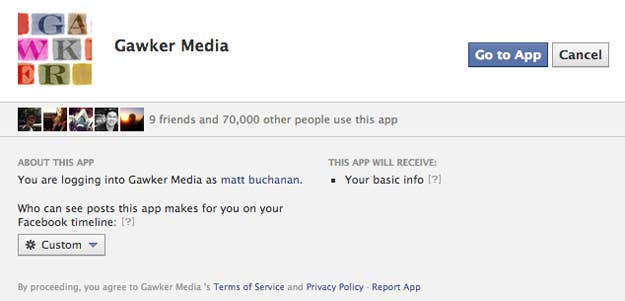
Mozilla just took a big shot at Facebook — and even though tech observers seem skeptical that it'll work, it has the capacity to be disruptive to Facebook's plans to infiltrate every aspect of our online lives.
It's called Mozilla Persona, and it's the best answer so far for the ever-expanding creep of Facebook (and its 1 billion users) across the web. In particular, it would sub in for Facebook any time you see one of those "Login with Facebook" buttons, and let you opt out of a lot of the sketchier social tracking that goes on behind the scenes. It's a smart take on a common problem, in keeping with Mozilla's open-source, non-profit ethos — but the real news is that it would cut off Facebook's info-gathering network at the knees.
Social networks have been slowly taking over the identification function on the internet. For example, when a third-party commenting system wants you to commit to a single identity, increasingly, that's through Facebook or Twitter using protocols like OAuth. Persona wants to break that function away from the larger networks, giving you more control over your data and your online identity. You'd share what you want, when you want, and not have to worry about advertisers knowing when your birthday is.

There's still plenty of reason to be skeptical. Mozilla isn't much of a player in the mobile or social world, and that's made them look shakier as we move away from desktop browsing. The words "comment authentication" also aren't likely to light up anyone's dashboard. But mostly, there's a creeping sense that this is simply a fight they can't win.
At its heart, Persona is an extremely low-impact social network — but it's still a social network, and people don't need another one. The conventional wisdom is that the new crop of networks will be built on top of someone else's platform — think of Airtime, which was built on top of Facebook — which would defeat the whole purpose of Persona. To launch independently like Google+, you need the kind of muscle and built-in userbase that a non-profit like the Mozilla Foundation just doesn't have. Even that will only get you to, well, Google+. And Google has a shot at billions of dollars in ad targeting to call them onward. Persona's plan is to forgo data-harvesting entirely. The plan is to not make money. To anyone trained for seed rounds and IPOs, it's almost incomprehensible.
But if that's true and Persona sinks, it's worth thinking of what it will mean for Facebook and any other globe-spanning private networks that spring up in the next few years. Identity isn't just a technical term. If companies like Facebook become the source of all identification on the web, they'll have an unsettling amount of control over who we are online. (Hence, in part, 4chan's unwavering commitment to anonymity.)
The social web has a lot of bad tendencies, from frictionless sharing to web-wide tracking, and a lot of them are more popular with advertisers than they are with users. The only way we're likely to check them is with something like Persona that separates the useful infrastructure from the bad-but-profitable practices that come with it.
Without that, Facebook will probably get worse before it gets better.
